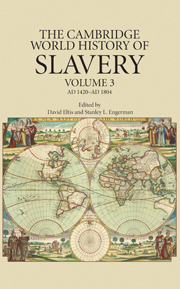Book contents
- Frontmatter
- Contents
- List of Maps, Figures, and Tables
- Contributors
- Series Editors' Introduction
- 1 Dependence, Servility, and Coerced Labor in Time and Space
- PART I SLAVERY IN AFRICA AND ASIA MINOR
- PART II SLAVERY IN ASIA
- PART III SLAVERY AMONG THE INDIGENOUS AMERICANS
- PART IV SLAVERY AND SERFDOM IN EASTERN EUROPE
- PART V SLAVERY IN THE AMERICAS
- PART VI CULTURAL AND DEMOGRAPHIC PATTERNS IN THE AMERICAS
- PART VII LEGAL STRUCTURES, ECONOMICS, AND THE MOVEMENT OF COERCED PEOPLES IN THE ATLANTIC WORLD
- PART VIII SLAVERY AND RESISTANCE
- Index
- References
1 - Dependence, Servility, and Coerced Labor in Time and Space
Published online by Cambridge University Press: 28 September 2011
- Frontmatter
- Contents
- List of Maps, Figures, and Tables
- Contributors
- Series Editors' Introduction
- 1 Dependence, Servility, and Coerced Labor in Time and Space
- PART I SLAVERY IN AFRICA AND ASIA MINOR
- PART II SLAVERY IN ASIA
- PART III SLAVERY AMONG THE INDIGENOUS AMERICANS
- PART IV SLAVERY AND SERFDOM IN EASTERN EUROPE
- PART V SLAVERY IN THE AMERICAS
- PART VI CULTURAL AND DEMOGRAPHIC PATTERNS IN THE AMERICAS
- PART VII LEGAL STRUCTURES, ECONOMICS, AND THE MOVEMENT OF COERCED PEOPLES IN THE ATLANTIC WORLD
- PART VIII SLAVERY AND RESISTANCE
- Index
- References
Summary
Slavery is generally regarded as the most extreme form of dependency and exploitation. This project attempts to cover types of dependency in addition to slavery, although it is clear from both the overall title and the program for the project's third volume that slavery gets considerably more attention than do other types of dependency. This reflects in part the modern preoccupation with individual freedom and equality before the law accorded by citizenship now acknowledged, at least as an ideal, just about everywhere in the modern world. Slavery may not be completely eradicated today, but it had lost irrevocably the ideological struggle perhaps as early as the first half of the nineteenth century, with only minor rearguard actions (in ideological terms, that is) in the antebellum South and less certainly in Hitler's Germany and the Soviet gulags. Such a circumstance – amazing in its rapidity and completeness from a worldwide historical perspective of human behavior and beliefs – is taken for granted today. The more complete the victory of the view that slavery should not exist nor should have ever existed, the more remote slavery itself appears, but at the same time the greater the modern fascination with the institution becomes. And the more remote it appears, the easier it is to treat slavery simply as an evil practiced by evil men, and the harder it is to understand it in human terms. At the very least, modern preoccupations with freedom and individual rights drive the fascination with slavery.
- Type
- Chapter
- Information
- The Cambridge World History of Slavery , pp. 1 - 22Publisher: Cambridge University PressPrint publication year: 2011
References
- 1
- Cited by

